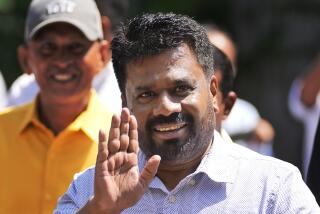A Thai surprise
- Share via
IT WASN’T ALL THAT LONG AGO that governments in Thailand had the lifespan of a butterfly, and the only constant was poverty. That has changed in recent years, but the sudden resignation Tuesday of Prime Minister Thaksin Shinawatra was an uncomfortable reminder of the fragility of Thailand’s democracy.
Thaksin was brought down not by popular vote but by Bangkok street protesters. Elected in 2001, Thaksin was Thailand’s longest-serving prime minister and once its most popular. He won a majority of the votes in a snap election over the weekend, yet his victory did nothing to soothe angry urbanites fed up with his autocratic style. Apparently realizing it would be impossible to run the country with its capital paralyzed by protests, Thaksin cleaned out his desk and appointed his deputy, Chitchai Wannasathit, as acting prime minister.
Thaksin’s fall comes amid something of a constitutional crisis in Thailand. A suspicious business deal by Thaksin’s family in January prompted the demonstrations, but the real source of the public outrage lay much deeper. Long used to multiparty politics, Thailand under Thaksin became essentially a one-party state, and many believed that the prime minister was undermining the checks and balances on his power. One of the wealthiest people in Thailand, he was suspected of buying or bullying his way into control of the judiciary, the media and the parliament.
The challenge for the new government will be to impose reforms that will put the executive branch back on a more even footing. That may be difficult, given that it will take weeks simply to iron out complications caused by the opposition’s refusal to vote in Sunday’s election, leaving at least 38 parliamentary seats unfilled. Amid seething public discontent, delays or confusion could well lead to violence.
Thaksin was neither a hero nor a villain for his country. He oversaw an economy that was booming before the 2004 tsunami and is now rebounding from the damage. He brought government healthcare and low-interest loans to Thailand’s rural poor. At the same time, his heavy-handed management of a Muslim insurgency in the south may have exacerbated it, and his war on drugs is believed to have sparked hundreds of extrajudicial killings by police.
One effect of his departure will be to throw the negotiations between the United States and Thailand over a free-trade pact into disarray. If the constitutional issues threatening the nation’s stability can be worked out, though, Thaksin’s resignation could help restore public confidence in Thailand and shore up a democracy in need of repair.
More to Read
Sign up for Essential California
The most important California stories and recommendations in your inbox every morning.
You may occasionally receive promotional content from the Los Angeles Times.













